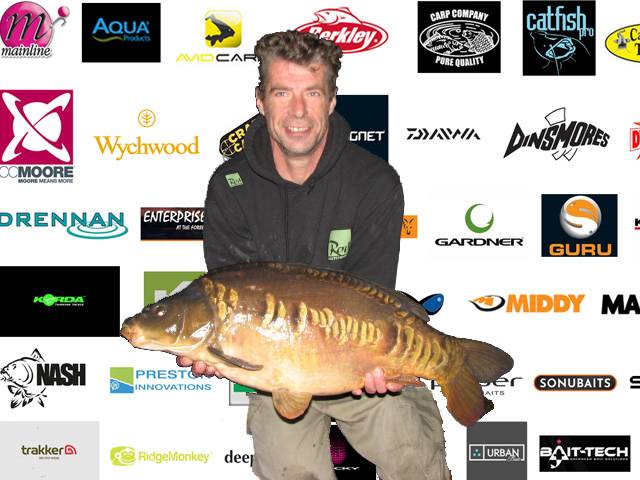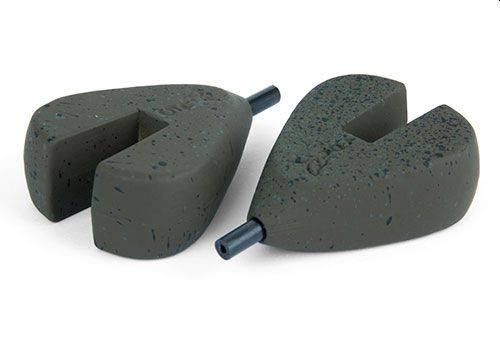-
Posts
333 -
Joined
-
Last visited
-
Days Won
31
Content Type
Profiles
Forums
Gallery
Blogs
Events
Articles
Everything posted by carpepecheur
-
I think I have posted this clip on here before but it does show an alternative way of getting a lot of bait out quickly. If you are prepared to experiment you can get a large amounts of bait out quite a long distance with very little effort. On the lake shown in the clip, I was using it quite regularly at 70 metres. (which is where the fish were not its maximum range). It costs next to nothing to make.
-
It is not clear what you mean by that question. The atmospheric pressure at the water surface will be less compared to waters at lower levels and will vary with current weather conditions. Hydrostatic pressure will increase with depth of water in the same way as lakes at lower levels. What effect from pressure are you worried about?
-
I had a similar problem. I could not tighten up the rear drag tight enough. All I did was loosen the baitrunner drag as far as it would go then strip off some line against the light drag. I then reset it to it normal position and was then able to tighten up the rear drag enough after that, I have no explanation why but worth a try before going in.
-
I am lucky enough to be able to collect them direct from the growers in the Valencia region of Spain. The bonus, apart from being able to choose the biggest and freshest tiger nuts at a sensible price, is they make a delicious milk from Tiger Nuts called horchata. If you are ever there on holiday i the region, I recommend you try some. It is so easy to prepare. Just soak then boil then let it stand for a few days until it is irresistibly gooey to carp. I have never tried ready prepared nuts but cannot imagine them being as good.
-
As Yonny implies, there is no substitute for personal experience. I have also observed the same thing and have been using very short rigs for some time. From the millisecond the carp takes the bait there is a chance of it being ejected. I believe the longer the hook link, the more time you are giving the carp a chance to eject your bait. That is why I prefer short and active rigs. I seem to be out of step with the rest of you because I still use bottom baits in preference to pop ups. That may be more a failing of my pop up technique than anything else.
-
Many years ago, I got banned from a well known trout water in Scotland where we were catching huge pike using trout as livebait. Our offence was not for mistreating their precious trout but because we returned the pike ALIVE.
-
Food seems to be much more important to daily life in France than it is in UK. Checking out a new lake, I came across a couple of French anglers. “Any luck?” I asked. “Don’t be silly”, was the reply, “we haven’t even lit the barbeque yet!”
-
A French guy stopped at as he was leaving the lake today. “Any luck?” he asked. “About half a dozen carp but nothing very big”, I replied “How about you?” “I was fishing for perch (for the table)” he said “but caught nothing” then he added “I see you are fishing English style “ “Why, because I am fishing on the bottom?” I queried. “No” he said “Because you are put them all back after you catch them”
-
-
You have just highlighted the opposite of confidence. How many times have you heard people talking about fishing a “hard water”? I do not think there is such a thing. Different waters require different tactics. By describing a water as “hard” you are preparing yourself for failure.
-
A little off the topic of confidence but a true story regarding hypnotherapy. Client phones up and asked how much he would be charged to quit smoking. "Right", I said, "work out how much you smoke in just one month and that's what I'll charge." "Well I smoke around 30 cigarettes a day and each packet costs me .......... blooming hell", he said "I can't possibly afford that", and he slammed the phone down.
-
There's a difference between what I think of as confidence and recklessness. To be confident you need to try and anticipate every possible outcome and what the consequences are. I know nothing about horse racing but perhaps hard or soft going, form of your horse compared to others, what it had for breakfast etc. If you do this thoroughly you can nudge the odds in your favour but you will only see this over a period of time not on one race. Alternatively you could stick a pin in a list and live with the consequences. After a session of hypnotherapy to quit smoking a client went outside and lit up straight away out of habit. He immediately demanded his money back because it had obviously failed. He was asked to come back in 1 months time when he would get double his fee. He never returned.
-
Interesting points in your post Elmo. Your hypnotherapist is probably more skilled than you give credit for. Every client turns up with what is known as a “presenting problem” e.g. “I want to be a good gambler”. The therapist's job then is to work out what the real problem is. I think it is easy to miss the point about the significance of confidence. It is not really about what technique you are using when fishing, it is more about your own mind set. Confident people have more success than unconfident people. Read David Coulthard’s book “The Winning Formulae”. He confesses he was not the fastest or most talented driver in F1 but achieved considerable success by applying his mind. He would sit at home for hours mentally going through the next F1 start, anticipating every conceivable eventuality and methods to avoid or mitigate any problems. During the start of an F1 race, you have milliseconds to respond to a rapidly changing situation. If your subconscious mind is already programmed to react in an appropriate way you are likely to be more successful. Imagine two people on the start line of a 100 metre race. One is mentally rehearsing the start and visualising the race and seeing himself crossing the line first. The other one starts worrying about whether his shoelaces a going to come undone and trip him up. Which one is most likely to win? You can start to build confidence in carp fishing by applying your own experiences or that of others (reading their exploits etc). You can study fish movements, baiting strategies, clever rigs that are in fashion or one designed yourself. It doesn’t matter how you achieve that confidence. Put simply, if you are confident you will do better. When I am waiting for my next fish I do a Coulthard. I think what will happen if it takes off towards the snags to my left or heads for the tree roots on the opposite bank. What if I have to go in the water after it? Do I know where it is shallow enough to go in? Is the landing net ready to go? If I am drinking a cup of coffee, do I know where I am going to put it when I get a toner? Even if nothing happens I am planning my next strategy, change location, change rig or change bait? Who said fishing was a relaxing sport? Effort =reward.
-
I agree very important. This is a HUGE subject and one that is difficult to comprehend if you have not experienced it. For my sins, I qualified as a hypnotherapist. The power of the mind is phenomenal. This not just some mumbo jumbo, pseudo-science speak. It actually works. For example, if you think you are in control of your own actions, try getting on a bike and forgetting how to ride it or try jumping into a lake and forgetting how to swim.
-

Tighter fit Inline Leads
carpepecheur replied to Simon KG's topic in Carp Fishing Tackle and Equipment
That IS a good idea. I have tested it in a tank to see what happens and, with the collar on, it seems to be tangle free. However, when the world cools down a degree or two, it needs testing in a working environment. -

What’s the scariest experience you’ve had whilst carp fishing?
carpepecheur replied to Brutus's topic in UK Carp Fishing
Did you actually see someone or just hear heavy breathing? I don't want to be funny but are you sure it wasn't just a hedgehog? -

Tighter fit Inline Leads
carpepecheur replied to Simon KG's topic in Carp Fishing Tackle and Equipment
Good point and thanks for the warning. I am sure mine were pukka and they cost €2.50 each. I can only buy mail order as nearest store is too far away. -

Tighter fit Inline Leads
carpepecheur replied to Simon KG's topic in Carp Fishing Tackle and Equipment
They are called Camotex impact leads. I am quite impressed with them and have been experimenting today. I made a crude video of how I intend to use them. I will eventually video one under lake conditions but at the moment it is 40 deg outside so to hot too be messing about. o -
I totally agree that confidence is everything. I never go fishing without knowing I am going to catch a fish. Of course, sometimes I am wrong in my convictions and then I learn something new. I like the challenge of solving problems and have learnt some new things by participating on this thread. I do not understand the thinking behind the need to make a swivel tighter in a semi fixed lead but I can offer an alternative solution. Instead of changing anything about the lead, before threading your line, put some conventional float stops on the line then when the lead is tied on, simply push them up against the back of the lead. The more stops you put on the larger the force required to slide the lead. My Fox COG leads turned up in the post today so I am going to be in my element experimenting with them.
-

Tighter fit Inline Leads
carpepecheur replied to Simon KG's topic in Carp Fishing Tackle and Equipment
I agree with many of your points Yonny:- It goes without saying that sharp hooks are a must. Of course sort out the feeding situation. And yes the carp can use a tight lead to throw a hook But as for overthinking and there being enough existing solutions I disagree. I have been using my active lead solution very successfully for over 6 years now and I am still improving it. I do not know of anyone else doing the same thing. The following is an early prototype. -

Tighter fit Inline Leads
carpepecheur replied to Simon KG's topic in Carp Fishing Tackle and Equipment
I did not want to give the impression that I thought what was being suggested was dangerous. I was trying to make the point that the looser the swivel was coming from the lead the safer it was for smaller fish. Often I have wound in and found something small on the end that not only has wasted all the time that rig was in the water but, if it had been a breakoff, would have killed that small fish. I agree with Simon that inline leads are superior because they are less prone to tangle. That is why I think the Fox COG is head and shoulders above the Korda COG. Lead clips also have more play in them before the bolt effect comes into play which gives the fish that little bit extra time to eject the bait. This is clearly demonstrated in the video Highy posted. Like Simon I prefer short rig lengths for the same reason. It gives the fish less time to eject the bait. I do not understand why, once the swivel has pulled clear of the lead, a small fish cannot be detected in weed. Is this because the weed causes too much friction on the line for its small movements to be detected? Either way free flowing or stiffly fixed you are not going to detect it. My solution, which I confess no one else seems to like, is to turn your weight into an active bolt lead. Simply put a large steel washer on the lead just short of the COG. Wind your line as tight as you can so that the washer bites in the silt or comes against a small unevenness in the lake bed. You then fish with a bend in your rod. When a fish takes, the hold of the washer is released, the rod springs straight and it jerks the weight towards you just a little bit. This increases the bolt effect by adding this extra force to the COG weight. More importantly (and I am only guessing here) the sudden movement of the weight frightens the fish into moving off before it has had time to eject the bait. This photo shows how I got it wrong. -

Tighter fit Inline Leads
carpepecheur replied to Simon KG's topic in Carp Fishing Tackle and Equipment
No for the first time in my life, I find myself at odds with many others. The purpose of a semi fixed lead is to provide a safe rig in the event of a crack off or when pulling for a break in snags. By increasing the pressure required to release it, surely you are making your rig less safe? If a double figure carp takes your bait, I am sure it will have little trouble shifting even the stiffest semi fixed lead. However, on two occasions I have caught a 6-inch carp on a 20mm boilie, even though the boilie was too big to fit inside its mouth. That 6-inch carp could grow up to be a record breaker. It would be a shame to expose it to such a dangerous rig so early in its life. Another problem with a semi fixed lead is that if a small fish takes the bait but is too small to shift the weight, it just hangs there without you knowing thus preventing you catching something larger. When using a free running lead, you will detect even small fish movements but you lose the bolt effect of the lead. This is where the technique described in the video that Highy posted is so interesting. You can have a bolt effect and a free running lead. I intend improving on it by using a Fox COG lead and then adding a collar to turn it into an ACTIVE bolt lead. -

Tighter fit Inline Leads
carpepecheur replied to Simon KG's topic in Carp Fishing Tackle and Equipment
So do I understand you correctly Simon, in that you are saying that when a fish goes into the weed, you want the lead to be tight enough not to be released? Also you don't want the lead to slide down the line (discharge?) when playing a fish. -

Tighter fit Inline Leads
carpepecheur replied to Simon KG's topic in Carp Fishing Tackle and Equipment
Actually there is a very good case for a looser fitting swivel in an inline lead. It was discussed on this forum here:- -
Thanks for the link Highy. That set up in the video is just what I have been looking for. I have started fishing a lake with too many small tench which are a nuisance. They are big enough to get hooked but not big enough to move the weight of a traditional, semi fixed, inline, bolt lead. I am not a big fan of a straightforward running lead (which would detect small fish movement,) because you lose the bolt effect. The video shows a technique which seems to have the best of both worlds. I would go one step further and use a fox impact lead which acts as COG lead. to give a more efficient bolt effect.









